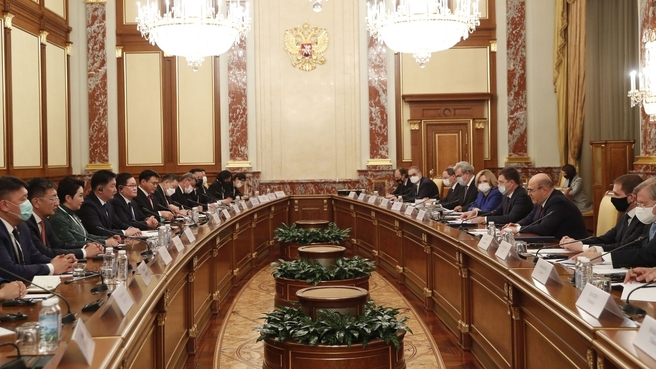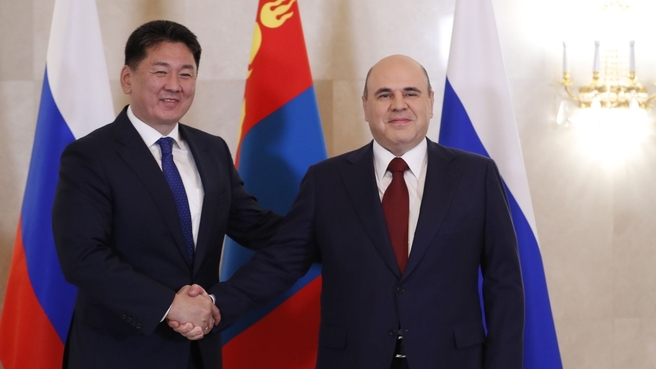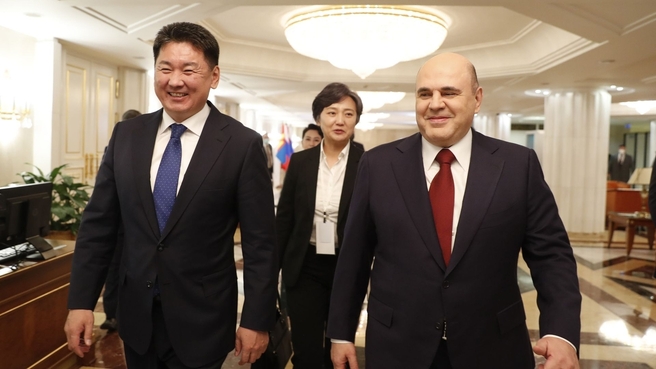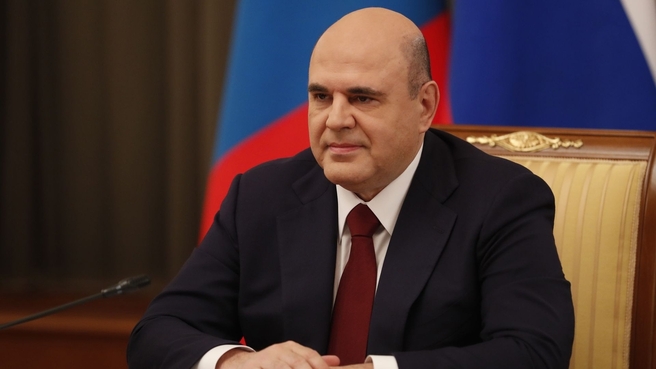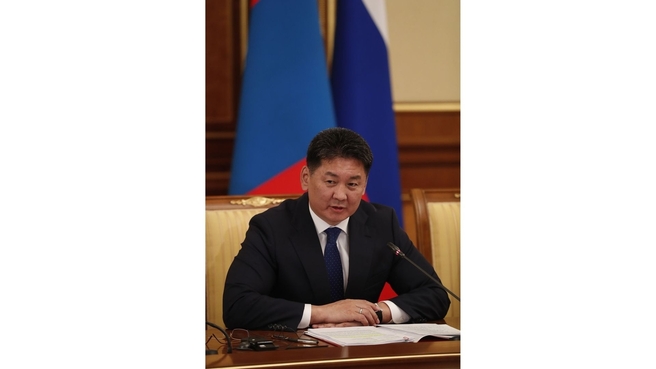Mikhail Mishustin’s meeting with President of Mongolia Ukhnaagiin Khurelsukh
Excerpts from transcript:
Mikhail Mishustin: Good afternoon, Mr Khurelsukh, and welcome to the Government House of the Russian Federation.
I know that this is your first visit to Russia as President of Mongolia. However, you visited Moscow in December 2019, when you were Prime Minister.
I also know that yesterday you had substantive talks with President of Russia Vladimir Putin and made a number of important decisions regarding the development of Russian-Mongolian relations. Yesterday he and I also had a detailed discussion of the adopted decisions and plans. Our two countries’ governments will ensure strict implementation of the agreements reached by the heads of state.
Mr Khurelsukh, I would like to use this occasion to ask you to pass on my best regards to my counterpart, Prime Minister of Mongolia Luvsannamsrain Oyun-Erdene. We had a long conversation on November 9, when we examined in great detail the issues related to our countries’ trade and economic cooperation.
Mongolia is a very important partner of Russia in the Asia-Pacific Region. For centuries, our two countries have been linked by friendly, neighbourly and partnership relations. We genuinely value the longstanding traditions of camaraderie in arms and mutual assistance of the Russian and Mongolian peoples. In 1939, our soldiers rallied together to defend Mongolia’s sovereignty and independence. We will always remember our Mongolian friends’ assistance to our country during the Great Patriotic War.
The Russian Government is interested in strengthening cooperation with Mongolia in all fields. The Treaty on Friendly Relations and Comprehensive Strategic Partnership, signed in September 2019 and enacted in September 2020, has provided a reliable framework for this.
We prioritise the development of trade and economic interaction, the implementation of large joint projects in industry, energy, transport, agriculture, environmental protection and, of course, cultural and humanitarian projects.
We have revived trade, which contracted last year due to the coronavirus pandemic. In January-October, it increased by 22 percent compared to 2020, reaching $1.43 billion. I am confident that we have every opportunity and possibility of building up cooperation when it comes to transport infrastructure, high technologies, and the digital and green economy.
I would like to specifically highlight the importance of strengthening cooperation between the Eurasian Economic Union and Mongolia. This joint work will open up new opportunities for increasing trade exchanges, will create favourable conditions for launching lucrative projects in various fields and will certainly promote the Greater Eurasian Partnership initiative proposed by President of Russia Vladimir Putin.
We are jointly fighting the coronavirus infection. Russia has supplied about 5,500 test kits and 142,000 doses of the Sputnik V vaccine to Mongolia. We also place great importance on cooperation in science and education. More than 65,000 Mongolian friends hold degrees from Russian universities.
We also welcome the Mongolian Government’s consideration for the Russian language. It is obligatory for Russian to be included in the school curriculum as a core subject starting from the seventh grade, and we see this requirement as a good sign of continuity in the development of friendly Russian-Mongolian ties.
I propose discussing the most important aspects of our cooperation and I am giving the floor to you, Mr Khurelsukh.
Ukhnaagiin Khurelsukh (retranslated from the Russian translation): Mr Mishustin,
I am pleased that we could meet today and make each other’s acquaintance.
Our two countries are developing truly good relations. We have wonderful, history-based relations. This year, we are celebrating the 100th anniversary of the establishment of diplomatic relations between our countries. I am happy to be on a visit to the Russian Federation as President of Mongolia during the celebrations dedicated to this anniversary.
In 2019, Mr Vladimir Putin paid a visit to my country to attend the festivities marking the 80th anniversary of the Khalkhin Gol victory. At that time, our relations reached the level of comprehensive strategic partnership and we signed the Treaty on Friendly Relations and Comprehensive Strategic Partnership. This treaty of unlimited duration is evidence of how good and significant our relations are.
Mr Putin and I had very positive, trust-based talks yesterday. We reviewed the 100 years of our relations, identified their priorities for the next century, and outlined a roadmap of our future cooperation.
During this visit, we have approved a joint declaration, a political document that sets the framework for our cultural, economic, trade and customs cooperation. Relevant documents on several areas of economic activity were signed as part of my visit.
The most recent meeting of the Intergovernmental Commission, held in late November, was a good component of the preparations for my visit.
Deputy Federation Council Chair Kosachyov, Deputy Prime Minister Abramchenko, Deputy Prime Minister Overchuk, and Chief of General Staff Gerasimov also paid visits to my country.
All these visits included talks on how to intensify our cooperation and bring it to a new level. I think that my current visit is also important in terms of optimising our bilateral cooperation.
In the 20th century, we had a wonderful friendship and comradeship. We supported each other both during the war and in the peaceful postwar period. The Soviet and Russian people played a major role in upholding my country’s independence and sovereignty. They helped cultivate our virgin lands and establish cultural ties. We even managed to organise a joint space flight.
Mongolia is one of 16 countries neighbouring on Russia. Our relations are an example of the kind of relations that can exist between neighbouring countries not only in our region but also all over the world. There are neither political differences between our states, nor territorial disputes. We have coexisted in a friendly manner and collaborated for a long period of time, and we are quite proud of this.
